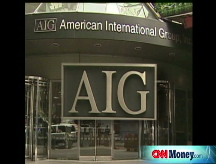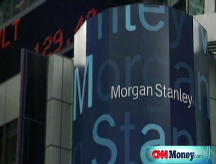Oil rises on Wall Street jitters
The financial implosion has the oil market concerned that demand will shrivel, but commodities are still a better bet than the stock market for a lot of investors.

NEW YORK (CNNMoney.com) -- Oil prices churned Thursday as analysts weighed the impact the recent turmoil on Wall Street would have on demand for energy with a desire to move assets out of stocks and into the perceived safety of commodities.
Oil traded up 72 cents to settle at $97.88 a barrel, after having run up as high as $102.24 earlier in the session. On Wednesday, oil prices jumped $6.01 a barrel - the second largest one-day surge on record - to settle at $97.16 a barrel.
The rise in oil was "because of a crisis of confidence in the U.S. economic system," said Flynn, and investors look to oil "as a safe haven" as well, said Flynn.
Earlier in the session, oil had raced past the $100-a-barrel mark to touch $102, as the chaos on Wall Street motivated investors to move out of stocks an into safer investments, such as oil, gold and Treasurys.
Big jumps: The oil market has been making big moves every day this week, reeling from the devastating news on Wall Street, as investors and traders digest an unprecedented set of moves in the financial sector.
"What could have been true an hour ago could have totally changed," said Andrew Lebow, a broker at MF Global in New York.
On Monday and Tuesday, oil prices tumbled $10 as the oil market saw the implosion of Wall Street as another factor that will cripple demand. Crude prices have fallen sharply off their record of $147.27 a barrel hit July 11.
On Wednesday, however, oil prices staged a late day rally as investors decided that while oil was a volatile market, it was a safer place to have assets than the stock market.
Wall Street caves: Early Thursday, a consortium of central banks coordinated their forces to inject nearly $180 billion dollars into the global economy. The Federal Reserve worked with the Bank of Canada, the Bank of England, the European Central Bank (ECB), the Bank of Japan, and the Swiss National Bank to pull off the effort to juice the global economy.
The move came on the heels of three days of turmoil in the financial sector that began early Monday when Lehman Brothers (LEH, Fortune 500) filed for bankruptcy.
In the days that followed, Bank of America (BAC, Fortune 500) purchased the struggling Merrill Lynch (MER, Fortune 500) and the beleaguered American International Group (AIG, Fortune 500) received an $85 billion government loan to stave off bankruptcy. By Thursday, there was speculation about Washington Mutual (WM, Fortune 500) putting itself up for sale.
The unprecedented news of the week jolted the stock markets. On Wednesday, the Dow Jones industrial average fell 449 points in its second worst session of the year. The worst session - in fact, the worst on Wall Street in 7 years - came Monday when the Dow lost 504 points.
Dollar: Oil prices tend to move in the opposite direction of the dollar. In the early part of the session, when oil raced to $102, the dollar was losing ground. But in late morning "the dollar snapped off its low," helping crude prices ease off their highs, said Tom Orr, director of research at Weeden & Co., in an email.
Because crude oil is traded in U.S. currency around the globe, when the dollar loses value, it pushes up the prices of crude. Conversely, when the dollar gains, oil prices move lower.
Oil and gold: The price of gold rose $70 on Wednesday, and when investors run to gold, that pulls the other commodities up, according to Phil Flynn, senior market analyst at Alaron Trading. Gold prices were nearly $50 higher on Thursday.
"When you buy a barrel of oil, you know [exactly] what you are getting," said Orr. However, he explained that when you purchase a share of a financial company right now, it's not a tangible asset. "Your liabilities are unknown."
The oil market has been under serious pressure as demand for energy has fallen off, however. The concern about demand "is one of the reasons is why we are not at $150" in this recent flight to commodities, said Flynn.
"Even though in the short term, people are running to oil as a safe haven, the minute we get some stability, the focus will be on softening demand and oil will collapse once again," he added.
Storms: Wall Street and the economic slowdown have been the focus of the oil market in recent sessions. But the Gulf of Mexico oil region was still struggling to get back on its feet after two Hurricanes - Gustav and then Ike - pummeled the production and refinery rich area.
Also, in its weekly inventory report released Wednesday, the Energy Information Administration said that gasoline supplies fell by 3.3 million barrels last week to 184.6 million barrels, the lowest level since 1990. Crude stocks fell by 6.3 million barrels, according to the same report.
The decline in crude and gas stockpiles was a result of the shuttered production facilities, both in anticipation of the storm and as a result of damage and flooding.
As of Thursday, 12 refineries in Texas and Louisiana were shuttered, according to the Department of Energy, which resulted in a 3 million barrel decline in refinery capacity. Meanwhile, 95.9% of crude production and 82.3% of natural gas production in the Gulf of Mexico remained closed.
According to a report from the Minerals Management Service, 28 of 3,800 offshore platforms were destroyed by Hurricane Ike. Personnel from 425 out of 717 - or 59.3% - of the production platforms remained evacuated, according to MMS as of Wednesday. ![]()






